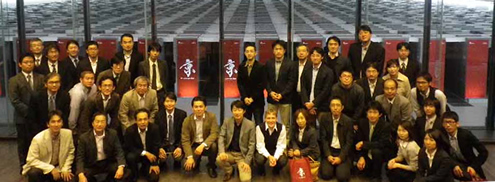SCLS Efforts
What is SCLS?
SCLS (Supercomputational Life Science) comes from the English translation of the Japanese for Strategic Programs for Innovative Research Field 1 “Supercomputational Life Science”. It is pronounced “escluse”.
The Strategic Programs for Innovative Research (SPIRE) is a program of the Ministry of Education, Culture, Sports, Science and Technology (MEXT) aimed at producing groundbreaking results in five strategic fields and the dramatic development of computational science and technology by maximizing usage of the High Performance Computing Infrastructure (HPCI) with the supercomputer “K computer” as a primary resource. The program was launched in April 2011.
Currently, the program is conducting advanced simulation research and human resource development programs centering on institutions (strategic institutions) that involve research and development and other activities in each of the strategic fields.
Strategic Programs for Innovative Research
Field 1 Supercomputational Life Science (Strategic institution: RIKEN)
Field 2 New Materials and Energy Creation
(Strategic institutions: The University of Tokyo Institute for Solid State Physics, National Institutes of Natural Sciences Institute for Molecular Science, Tohoku University Institute for Materials Research)
Field 3 Prediction of Global Change toward the Reduction and Mitigation of Natural Disasters (Strategic institution: Japan Agency for Marine-Earth Science and Technology)
Field 4 Industrial Innovations
(Strategic institutions: The University of Tokyo Institute of Industrial Science, Japan Aerospace Exploration Agency, Japan Atomic Energy Agency(JAEA))
Field 5 The Origin of Matter and the Universe
(Strategic institution: Tsukuba University, High Energy Accelerator Research Organization, National Astronomical Observatory of Japan)
SCLS Efforts
For SCLS, big breakthroughs are expected in the field of life science field both socially and academically. With RIKEN HPCI Program for Computational Life Sciences as the representative institution, universities and research institutes throughout Japan are participating and researching cooperatively. The four research projects of “Simulations of biomolecules in cellular environments“, “Simulation applicable to drug design“, “Hierarchical integrated simulation for predictive medicine” and “Large-scale analysis of life data” have been set up, and application research development using the K computer is being conducted for each theme. Through interactively understanding life phenomena in which various hierarchies such as genomes, proteins, cells, organs and the whole body, elucidation and predictions about the mechanism of diseases will be presented. Contributions to accelerating medical treatment and the discovery of new drugs development are expected. Furthermore, aiming for human resource development and the development of the computational science community, a computational science and technology promotion system is being established.
SCLS is trying to elucidate complex biological phenomena using the K computer, with the goal to help us all live healthier and more prosperous lives.
Participants
The University of Tokyo, Japan Atomic Energy Agency, Okinawa Institute of Science and Technology Graduate University(OIST), Tokyo Institute of Technology(Tokyo Tech), The National Institute of Advanced Industrial Science and Technology(AIST), Kyushu University, Okayama University, Osaka University, Yokohama City University, Kyoto University, Tokai University (in no particular order)
Next-Generation Integrated Simulation of Living Matter
In SCLS, dissemination of the research and development software released by ” Next-Generation Integrated Simulation of Living Matter ” (ISLiM) is continuing. ISLiM was a project that started at RIKEN as a key hub, from in October 2006, working closely with participating institutions to address research and development. It substantially involved the performance of next-generation supercomputers (= K Computer) to attain groundbreaking simulations only possible by using the performance of such supercomputers . It ended on March 31, 2013.
Collaboration with Pharma Industry and Medical Staff
SCLS is widely conducting outreach with the philosophy of “the establishment of human networks in computational life sciences and the dissemination of research outcomes”.
Since receiving a request for assistance from BioGrid Center Kansai, SCLS is has been actively supporting the theme of “Formulating the K computer in silico drug discovery platform to accelerate new drug development” adopted in the industrial usages of the K computer.
| Applicant Institution (Office) | BioGrid Center Kansai |
|---|---|
| Research Representative | Kyoto University Department of Systems Bioscience for Drug Discovery Yasushi Okuno |
| Participants |
|
| Themas |
|

SCLS Mission and Efforts
Our Mission (BioSupercomputing Newsletter Vol.5 SPECIAL INTERVIEW)
Development of R&D projects (BioSupercomputing Newsletter Vol.6 SPECIAL INTERVIEW)
Program Director Toshio Yanagida
Deputy Program Director Akinori Kidera
Deputy Program Director Yukihiro Eguchi
From Computational Science to Society
2013.6.21
【Symposium】 “Science, Public Welfare, Society – On the Concept of Information Transmission” (Lecture Hall, Science Council of Japan)
Working group to review concepts of delivering information from computational science to society
Progress of activities in 2011 and an interim report
MEXT Working group to review concepts of HPCI project promotion hereafter
Concepts of HPCI project promotion hereafter (Interim report)








